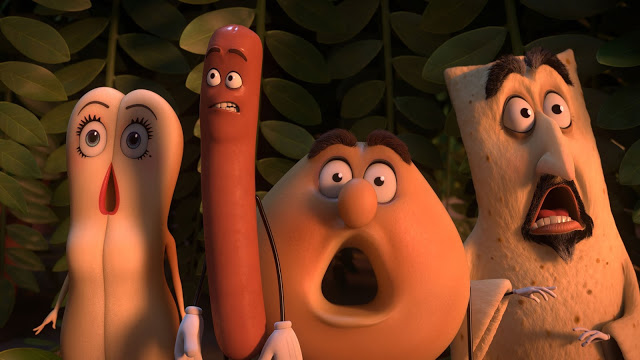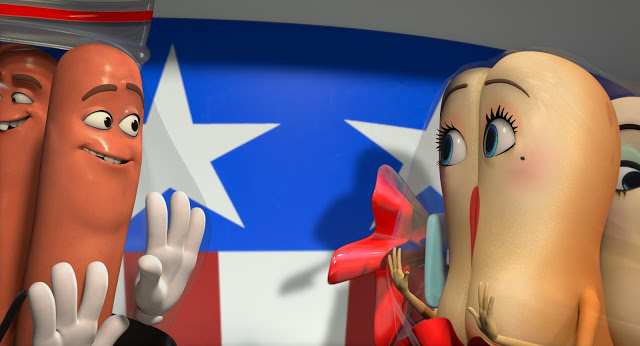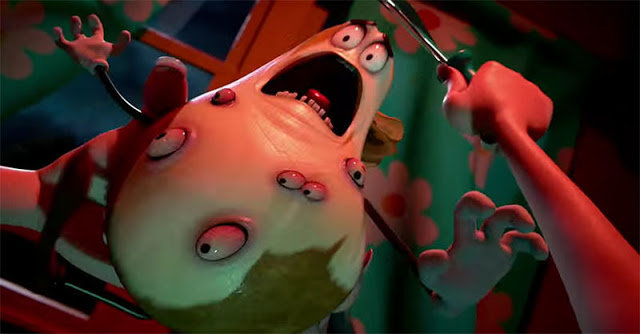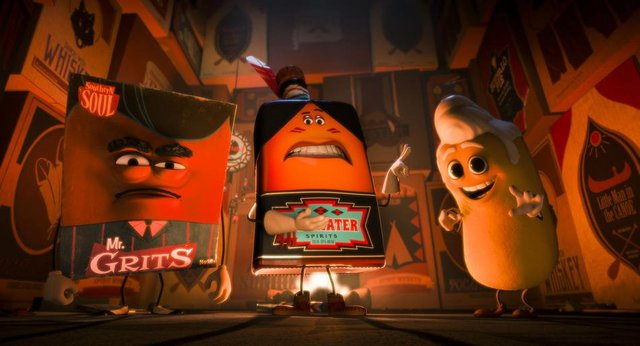The community at the center of Sausage Party is a vibrant melting pot, a diverse cross-section of ethnic backgrounds and religious faiths. But this neighborhood is also unified in its theism—although it hosts a number of different sects, most of its residents believe in some higher power. Some sing hymns together, while others pass down oral histories of their divinities; virtually all of them contemplate the existence of life after death and hope one day to ascend to a spiritual plane. In essence, this bustling hub of worship exhibits the kind of cultural variety that you might find in any American metropolis, where people regularly attend churches, synagogues, or mosques. There’s just one small difference that distinguishes the characters of this movie: They’re all foods.
The premise of Sausage Party, which was co-written by longtime best buds Seth Rogen and Evan Goldberg, sounds like an idea that they cooked up while getting stoned on the set of This Is the End, their woozy apocalyptic hangout comedy. (Virtually the entire voice cast of Sausage Party appeared in that film, while Kyle Hunter and Ariel Shaffir, who both executive-produced it, also receive screenwriting credits here.) That movie used the Rapture as scaffolding for a thoughtful investigation of male friendship and insecurity, and Sausage Party features an even crazier concept that masks an even more provocative study of human behavior. Curiously, it’s the latter that leaves a mark. A self-professed work of “adult animation”, Sausage Party is frequently funny and persistently filthy, but its commitment to excess suffers from diminishing returns. It’s the skewering of organized religion that really stings.
The plot is basically Toy Story on profanity-laced steroids. At a supermarket called Shopwell’s, the packaged foodstuffs are all sentient beings who can move and talk whenever people are out of sight. (Most of them look similar to the M&Ms from commercials, with four-fingered white gloves and matching shoes protruding from their food-based bodies.) They dream of being selected by human customers, whom they view as gods and who they believe will deliver them to “The Great Beyond”. Our hero is a hot dog named—you guessed it—Frank (Rogen), who longs to nestle inside Brenda (Kristen Wiig), the perky hot dog bun who resides on the same shelf. His lifelong goal appears to be realized when both he and Brenda are plunked inside the same shopping cart, but things go awry and—following a sequence that feels yanked from a Roland Emmerich disaster movie (complete with a splintered can of spaghetti helplessly attempting to scoop up its intestines)—they find themselves flung to the supermarket’s floor, far from both the comfort of their shelf and the beckoning majesty of the Great Beyond. They are joined by two other refugees from the shopping cart, Sammy Bagel Jr. (Edward Norton, doing his best Woody Allen impression) and Kareem Abdul Lavash (David Krumholtz), who are both members of the bread family but are also born-and-bred enemies.
As Sausage Party follows this quarrelsome quartet in its attempt to return to sanctuary, it settles in as a fairly straightforward road movie, spiking its meat-and-potatoes story with demented flavor. This is most evident in its language, which can be both ingenious and tedious. The screenplay features some deliciously clever wordplay, capitalizing on the food industry’s seemingly infinite number of homophones; there are lightning-fast jokes involving beets, meatloaf, queso, and even a lightbulb. (My favorite line in the film is a gleefully convoluted turn of phrase that incorporates relish, ketchup, and mustard without once referring to an actual condiment.)
Of course, many animated features make similar use of puns, but Sausage Party‘s dialogue is markedly different, replacing family-friendly tastefulness with aggressive lewdness. The script is riddled with curse words, a seemingly subversive choice that quickly grows tiresome. To be clear, I have no quarrel with profanity at the movies, animated or otherwise; the absence of swearing in art can actually be a sign of censorship or dishonesty. But Sausage Party‘s torrential vulgarity doubles as its laziest form of comedy. It suggests that there is something automatically uproarious about a cartoon character who repeatedly says “fuck”, when all that really does is encourage us to tune out. (Seth MacFarlane’s Ted hung its laughs on a similar hook, contending that naughty words were inherently funny when coming from the mouth of an adorable-looking teddy bear.) Ironically, it is when Sausage Party ii at its most insistently “adult” that it feels most childish.
To be sure, Rogen and Goldberg don’t treat excess cavalierly—to them, it’s an art form. (Recall the rampaging monsters from This Is the End, with their giant phalluses.) But while Sausage Party‘s extremism can be hilarious in small doses, it grinds on you as it wears along, as does its central villain, a literal douche (Nick Kroll) with a penchant for rape and a thirst for murder. By the time the movie reaches its gonzo climax—an outrageous action sequence in which humans and edibles do battle thanks to toothpicks laced with bath salts—it’s exhausting just to keep up, and that’s before even considering the denouement, an extravagant orgy that makes the infamous sex scene from Team America: World Police seem like an instructional video.
And so we could leave it at that, with the unremarkable recognition that Sausage Party is both funny and overwhelming. But Rogen and Goldberg are interested in more than hectic entertainment. They’re sincerely exploring the intersection in American society between faith and doubt.
Consider that the movie opens with a cheery musical number called “The Great Beyond” (composed in part by Disney legend Alan Menken), in which various foods proclaim their yearning to be chosen, oblivious to the reality that once they leave Shopwell’s, they’re destined to be sliced and diced, boiled and puréed. It’s easy to mock their blind faith as stupidity, and it becomes even easier when, in a parallel storyline, some recently purchased groceries (including hot dogs voiced by Michael Cera and Jonah Hill) witness firsthand the murderous actions of their supposedly benevolent deities. The cosmic joke’s on them, right?
Maybe. Certainly it’s possible to interpret Sausage Party as criticizing the institution of religion, which tends to demand obedience to scripture regardless of contrary scientific evidence. Undoubtedly, the film functions as a merciless attack on the fractious ideologies of insular creeds; in that aforementioned song, mustachioed bottles of sauerkraut announce their goal to “exterminate the juice”, while Kareem informs us that he’s been promised “77 bottles of extra-virgin olive oil” in the next life.
At the same time, the movie preaches tolerance and understanding. As Frank ventures deeper into the supermarket’s bowels—at one point getting high with “the non-perishables”, including a wise old bottle of firewater (Bill Hader) and an ornery package of grits (Craig Robinson)—he begins to question the belief system that he once accepted so completely. But he also learns that badgering those who are entrenched in their viewpoints is only likely to further that entrenchment, and that it’s crucial to approach different cultures with an open mind, even if you disagree with their tenets. Who knew?
I am not pretending that an animated movie in which a taco performs cunnilingus on a frankfurter bun has discovered the solution to the world’s many religious conflicts. But Sausage Party is at least a worthy peace offering, asking critical questions and encouraging us to search for the answers. As for Rogen and Goldberg, it’s fair to wonder if their devout commitment to silliness will prevent them from ever making something that’s truly great. But for all of Sausage Party‘s flaws, there’s considerable humor and intelligence here—enough for me to keep the faith.
Jeremy Beck is the editor-in-chief of MovieManifesto. He watches more movies and television than he probably should.





I sat next to Movie Manifesto and did not think near as much about this movie. I'm so impressed at your review. Clearly I missed a lot by dismissing it as "silly"! Good review.
Clearly I was inspired by my date.